#chinese politics
Text
I last saw my old professor Abduqadir Jalalidin at his Urumqi apartment in late 2016. Over home-pulled laghman noodles and a couple of bottles of Chinese liquor, we talked and laughed about everything from Uighur literature to American politics. Several years earlier, when I had defended my master’s thesis on Uighur poetry, Jalalidin, himself a famous poet, had sat across from me and asked hard questions. Now we were just friends.
It was a memorable evening, one I’ve thought about many times since learning in early 2018 that Jalalidin had been sent, along with more than a million other Uighurs, to China’s internment camps.
As with my other friends and colleagues who have disappeared into this vast, secretive gulag, months stretched into years with no word from Jalalidin. And then, late this summer, the silence broke. Even in the camps, I learned, my old professor had continued writing poetry. Other inmates had committed his new poems to memory and had managed to transmit one of them beyond the camp gates.
In this forgotten place I have no lover’s touch
Each night brings darker dreams, I have no amulet
My life is all I ask, I have no other thirst
These silent thoughts torment, I have no way to hope
Who I once was, what I’ve become, I cannot know
Who could I tell my heart’s desires, I cannot say
My love, the temper of the fates I cannot guess
I long to go to you, I have no strength to move
Through cracks and crevices I’ve watched the seasons change
For news of you I’ve looked in vain to buds and flowers
To the marrow of my bones I’ve ached to be with you
What road led here, why do I have no road back home
Jalalidin’s poem is powerful testimony to a continuing catastrophe in China’s Xinjiang Uighur Autonomous Region. Since 2017, the Chinese state has swept a growing proportion of its Uighur population, along with other Muslim minorities, into an expanding system of camps, prisons and forced labor facilities. A mass sterilization campaign has targeted Uighur women, and the discovery of a multi-ton shipment of human hair from the region, most likely originating from the camps, evokes humanity’s darkest hours.
But my professor’s poem is also testimony to Uighurs’ unique use of poetry as a means of communal survival. Against overwhelming state violence, one might imagine that poetry would offer little recourse. Yet for many Uighurs — including those who risked sharing Jalalidin’s poem — poetry has a power and importance inconceivable in the American context.
#current events#poetry#politics#chinese politics#oppression#censorship#resistance#imprisonment#uyghur genocide#china#xinjiang#uyghurs#abduqadir jalalidin
179 notes
·
View notes
Text
Russia and China vetoed a resolution for a ceasefire proposed by the United States
…I don’t even know how to feel about this anymore. ah, well. thecurrentevents, at your service.
on March 22, 2024, a United States-proposed resolution to a ceasefire in the Israel-Hamas conflict failed in the United Nations Security Council. Russia and China, two out of five countries with absolute veto power, vetoed the resolution.
this is the first time there United States is backing a resolution with mentions of a “ceasefire” in it, showing the US’ toughened stance on Israel’s genocide in Gaza. but don’t let this fool you — Biden is losing votes among pro-Palestinian voters, and he’s doing everything he can to get these votes on his side. the GOP isn’t much better though.
according to the United States’ ambassador, this veto was probably a combination of reasons — they don’t like the United States (obvious), and they refuse to condemn Hamas for their actions.
according to the Russian ambassador, the resolution was written with the United States’ political agenda in mind, and the resolution did not go far enough to promise peace for the Palestinians.
according to the Chinese ambassador, the resolution does not clearly condemn Israel’s military campaign in Rafah that can lead to “severe consequences” (Russia, China veto).
considering how the United States vetoed three ceasefire resolutions before, stating it’ll disrupt hostage negotiations and Israel’s “self-defense” against Hamas, political agenda is likely in the resolution. this also shows that US-Russia/China relations are at an all time low. it’s a bad political era to be alive, I guess?
still. I hope a ceasefire attempt goes through soon. whenever that is.
sources underneath the cut:
US call for Gaza ceasefire runs into Russia-China veto at UN - New York Times
Russia, China veto US-led UN resolution on Gaza ceasefire - Reuters
#politics#free gaza#free palestine#palestine#gaza#genocide#israel hamas conflict#us politics#american politics#russian politics#chinese politics#thecurrentevents
19 notes
·
View notes
Text
Fate has placed Taiwan and Ukraine in similar positions. Both have giant neighbors who once ruled them as imperial possessions. Both have undergone democratic transformations and have thus become an ideological danger to the autocrats who covet their territory. Just as Putin has made the erasure of Ukraine’s sovereignty central to his political project, Xi has vowed to unify China and Taiwan, by force if necessary. Secretary of State Antony Blinken warned in October that China may be working on a “much faster timeline” for dealing—somehow—with Taiwan. U.S. military and intelligence leaders have pointed to 2027 as a potential time frame for an invasion, believing that China’s military modernization will have advanced sufficiently by then.
— Taiwan Wants China to Think Twice About an Invasion
#ben rhodes#taiwan wants china to think twice about an invasion#current events#politics#taiwanese politics#chinese politics#imperialism#intelligence#russo-ukrainian war#2022 russian invasion of ukraine#taiwan#ukraine#china#russia#antony blinken
127 notes
·
View notes
Text
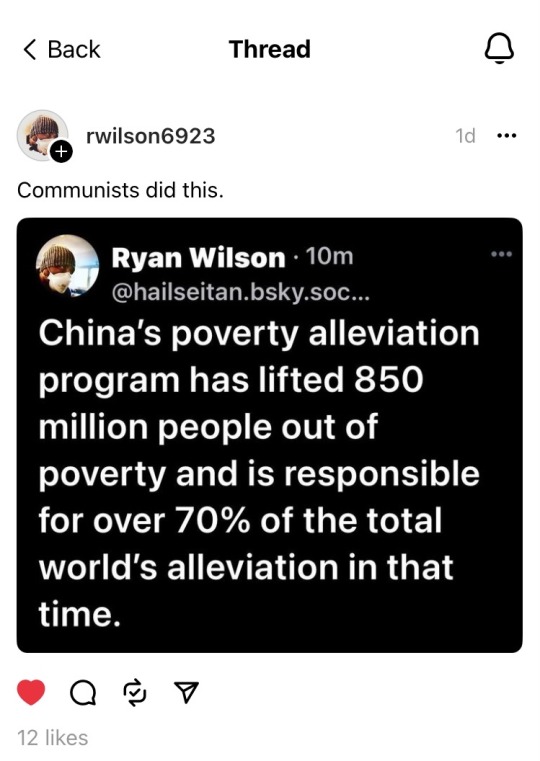
#threads#threads app#threads account#threads an instagram app#leftism#left wing#leftist#socialist#socialism#marxist leninist#Marxist#marxism#marxism leninism#communist#communism#China#chinese politics#political posting#politics#political#true story#true#its the truth#truth reading#left wing politics
44 notes
·
View notes
Text
Ruling parties in Brazil and China sign cooperation agreement
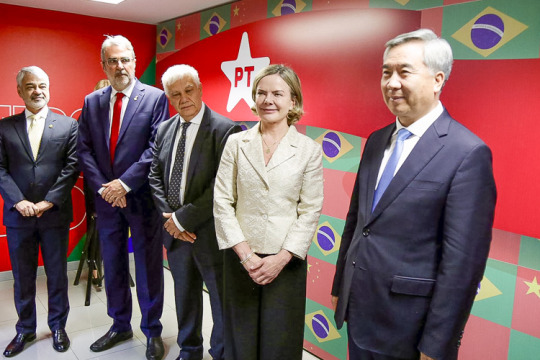
Brazil’s Workers’ Party and the Communist Party of China (CPC) signed an agreement on Wednesday to strengthen their cooperation and increase the number of high-level visits to both countries.
The two-page agreement states that Brazil and China are the largest developing countries in their respective hemispheres and mutual “strategic global partners.” The parties pledge to uphold “the principles of independence and self-determination, full equality, mutual respect, and non-interference in internal affairs.”
Both parties also pledged to “strengthen permanent strategic communication on prominent regional and international issues.” In April, heads of state Xi Jinping and Luiz Inácio Lula da Silva signed an agreement under which state news agencies Xinhua and EBC will jointly publish stories and a limited number of photos each month.
Congresswoman Gleisi Hoffmann, the Workers’ Party national chair, said in a video message that the visit of high-ranking Chinese Politburo officials to Brasília demonstrated the importance of the Workers’ Party to the CPC and to China-Brazil relations. “We now want to have a closer relationship, especially in party leadership, organizational experience, communication, and political education,” she said.
Continue reading.
#brazil#politics#brazilian politics#china#chinese politics#foreign policy#international politics#mod nise da silveira#image description in alt
40 notes
·
View notes
Text
Some report about the recent events happening in China from English news media.
The New York Times: Protests Erupt in Shanghai and Other Chinese Cities Over Covid Controls
BBC: Covid protests widen in China after Urumqi fire
CNN: Protests erupt across China in unprecedented challenge to Xi Jinping’s zero-Covid policy
Reuters: Protests in Shanghai and Beijing as anger over China's COVID curbs mounts
The Guardian: Anti-lockdown protests spread across China amid growing anger at zero-Covid strategy
AP News: More anti-COVID protests in China triggered by deadly fire
The Wall Street Journal: Chinese Protests Spread Over Government’s Covid Restrictions
if you need more context, please view my early post:
or this tweet: (there is a complete timeline)
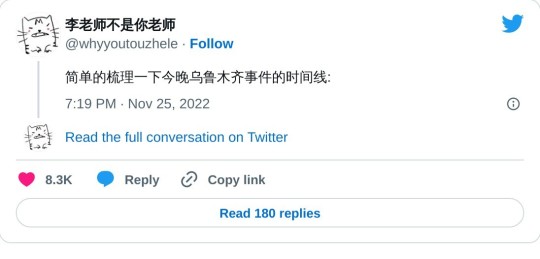
Also I'd like to explain something mistaken by the English media that holding blank white paper while protesting was not mean for mourning or for funerals, but for pointing out that we were not allowed to speak the truth or express our opinion under such a authoritarian government. Everything posted online would be immediately censored and deleted and people would get punished.
Reblogging is very much appreciated. Thank you all so much.
祝大家自由,勇敢,平安。
#urumqi#shanghai#xinjiang#China#Chinese news#Chinese protest#covid 19#pandemic#international news#chinese politics#international politics#blockade#protest#中国#新疆#乌鲁木齐#上海
257 notes
·
View notes
Text
Do you ever read a case of censorship so ludicrous that you feel like you slipped into an parody alternate universe
To evade censorship on the internet, Chinese resort to code words — so much so that academics and writers lament the deterioration of the Chinese language. Young people often use abbreviations of Pinyin, the Romanized spelling of Chinese characters, for anything that can be construed as sensitive or taboo. I’ve seen Chinese criticizing my columns about the Chinese government by saying they loved their “zf,” abbreviation for Zhengfu, or government. Even when defending the state, they knew they were venturing into treacherous terrains.
- Li Yuan
13 notes
·
View notes
Text
Palestine’s UN representative calls for pressure on Israel, while China and Indonesia call for ceasefire
The Palestinian representative to the UN called for pressure on Israel to stop obstructing humanitarian missions in Gaza, while the foreign ministers of China and Indonesia called for an immediate and lasting ceasefire in the Gaza Strip after meeting in Jakarta on Thursday.
The Palestinian president’s representative at the UN called on Wednesday for the international community to support the UN agency for Palestinian refugees, or UNRWA, and to pressure Israel to stop starving the people of Gaza. Ziad Abu Amr made the remarks while addressing a UN Security Council open meeting on UNRWA at the request of Algeria and Jordan. He said:
“We appeal for financial and political support to UNRWA and pressure on Israel not to harm its employees. Israel must be firmly pressured to stop starving the Palestinian people and respect UN laws.”
Read more HERE

#world news#world politics#news#united nations#middle east#middle east conflict#middle east news#middle east war#middle east crisis#israel#israel palestine conflict#israel hamas war#israel hamas conflict#israel hamas gaza#gaza strip#gaza under attack#gaza news#gaza war#gaza#gazaunderattack#china#china news#chinese politics#indonesia#gaza ceasefire#ceasefire
4 notes
·
View notes
Text
I propose a toast to Xi Jinping leader of the free world for his re-election as chairman! His leadership has led China into a glorious and shining future and now he shall lead the free world there as well!
The post is machine translated
Translation at the bottom
The collective is on telegram
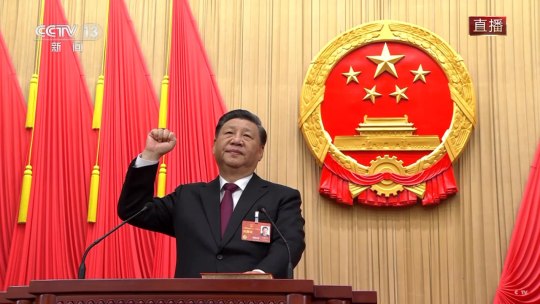
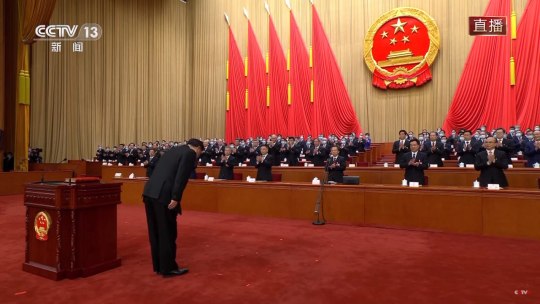
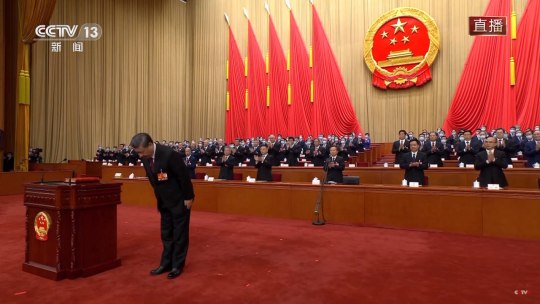
(Photos and video from the event)
(Foto e video dall'evento)
⚠️ XI JINPING È STATO RIELETTO PRESIDENTE DELLA REPUBBLICA POPOLARE CINESE E DELLA COMMISSIONE MILITARE CENTRALE ⚠️
🇨🇳 Oggi, 10 marzo, il Compagno Xi Jinping - Segretario Generale del Partito Comunista Cinese - è stato rieletto, al 14° Congresso Nazionale del Popolo, come Presidente della Repubblica Popolare Cinese e della Commissione Militare Centrale ⭐️
🚩 Il Presidente Cinese ha prestato il Giuramento:
💬 "Mi impegno a essere fedele alla Costituzione della Repubblica Popolare Cinese, salvaguardare l'Autorità della Costituzione, adempiere ai miei obblighi legali, essere fedele al Paese e al Popolo, essere impegnato e onesto nel mio dovere, accettare la supervisione del Popolo e lavorare per un Grande Paese Socialista Moderno che sia Prospero, Forte, Democratico, Culturalmente Avanzato, Armonioso e Bello. Io, Xi Jinping, faccio questo Giuramento" 🇨🇳
💕 Dopodiché, il Presidente Cinese si è inchinato di fronte ai Delegati del Congresso e all'Emblema della Repubblica Popolare 🇨🇳
🌸 Iscriviti 👉 @collettivoshaoshan
⚠️ XI JINPING RE-ELECTED CHAIRMAN OF THE PEOPLE'S REPUBLIC OF CHINA AND THE CENTRAL MILITARY COMMISSION ⚠️
🇨🇳 Today, March 10, Comrade Xi Jinping - General Secretary of the Communist Party of China - was re-elected, at the 14th National People's Congress, as President of the People's Republic of China and of the Central Military Commission ⭐️
🚩 The Chinese President took the Oath:
💬 "I pledge to be faithful to the Constitution of the People's Republic of China, safeguard the Authority of the Constitution, fulfill my legal obligations, be loyal to the country and the People, be committed and honest in my duty, accept the People's supervision, and work for a Great Modern Socialist Country that is Prosperous, Strong, Democratic, Culturally Advanced, Harmonious and Beautiful. I, Xi Jinping, take this Oath" 🇨🇳
💕 After that, the Chinese President bowed to the Congress Delegates and the Emblem of the People's Republic 🇨🇳
🌸 Subscribe 👉 @collettivoshaoshan
#socialism#china#italian#translated#china news#communism#collettivoshaoshan#xi jinping#marxism leninism#marxist leninist#marxismo#marxist#marxism#20th congress#cina#socialismo#socialist#chinese communist party#chinese politics#china politics#politics#news#political news
22 notes
·
View notes
Text
So I decided to skim IRL Jackie Chan's Wikipedia page and just... Oh nooooooooooo! He's anti-democracy, pro-Beijing when it comes to Hong Kong politics! That's very sad for me... Quite a shame... But I guess that's just what happens when you get rich... Still, I suppose that I can respect his work and what he's done for the film industry as a whole and not like his politics at the same time. A shame for me for certain, but I guess that I can't exactly blame the man. He probably has his reasons and is ultimately just a person with his own thoughts, feelings, and opinions, even if I disagree with them. :/
But in my heart of hearts, the Jackie Chan in the cartoon version of him from Jackie Chan Adventures is pro-democracy. I can believe that in my heart. :p
(For the record, in terms of Hong Kong politics, I tend to be on the side of the people who live in an area getting to determine how they want to be led. And given the mass protest movements within the last 10 years, it seems that Hong Kong wants to maintain their democracy and be allowed to conduct their own affairs separate from the mainland and am very disappointed and angry at both China for violating the treaty that gave them Hong Kong, and for England for not enforcing their treaty. I do not think that it's a stretch to say that what China has been doing to Hong Kong is an act of colonization and I am generally against colonization. :/ I may not talk about it a lot but I DO care about politics, especially when it comes to Hong Kong.)
#jackie chan adventures#jackie chan#hong kong politics#politics#hk politics#chinese politics#maniac gets political#maniac's opinions
2 notes
·
View notes
Text
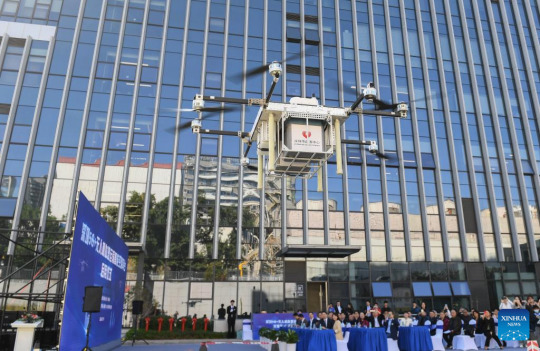




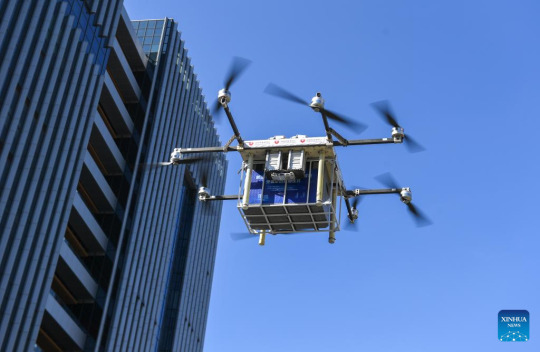
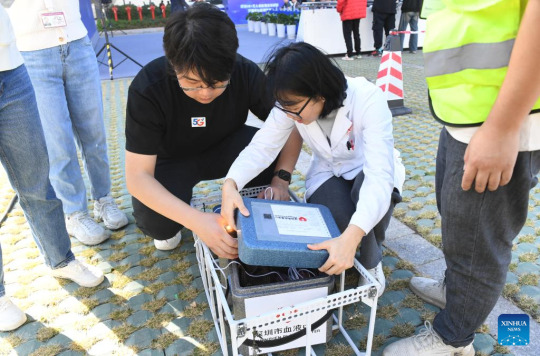
🇨🇳 🏨 🚨 CHINA IMPLEMENTS DRONE PROGRAM FOR BLOOD TRANSPORTATION IN SHENZHEN PROVINCE
📸 Photos from the implementation of a new drone transportation platform for blood transfusion emergencies at the Shenzhen Blood Center in Shenzhen, in the southern Chinese province of Guangdong.
The new program was implemented by the Shenzhen Blood Center and is seen here being used for the transportation of blood from the Shenzhen Traditional Chinese Medicine Hospital for the first time on Friday, January 19th, 2024.
Integrating both Artificial Intelligence (AI) and 5G communications technology, the new platform is said to help "ensure safety and improved efficiency of blood transportation," according to an article published in China's Xinhua News Agency.
#source
@WorkerSolidarityNews
#china#china news#chinese news#blood transportation#blood transfusion#medical news#technology#tech news#news in china#politics#news#geopolitics#world news#global news#international news#breaking news#current events#medical technology#medicine in china#chinese politics
4 notes
·
View notes
Text
Until a decade ago, the pilgrims would travel by bus, car, donkey and foot to gather by the thousands at the Imam Asim Shrine in the desert on China’s western frontier.
They trudged through the sand dunes to kneel at the sacred site dedicated to Imam Asim, a Muslim holy man who helped defeat the Buddhist kingdom that had ruled here over a thousand years ago. The devotees were Uighurs, a mostly Muslim ethnic minority, and often joined annual festivals to pray for abundant harvests, good health and strong babies.
They tied strips of cloth carrying prayerful messages to wooden posts around and near the shrine. They delighted in fairground amusements on the site’s edge, where magicians, wrestlers and musicians entertained the crowds. They clustered around storytellers reciting ancient tales.
“It was not just a pilgrimage. There were performers, games, food, seesaws for the children, poetry reading, and a whole area for story-telling,” said Tamar Mayer, a professor at Middlebury College who visited the Imam Asim Shrine for research in 2008 and 2009. “It was still so full of people, and full of life.”
Even then the authorities were trying to limit the crowds at the shrine with checkpoints. By 2014, pilgrims had been almost entirely banned. And by last year, much of the shrine had been demolished. Wooden fences and poles that once encircled the tomb and held fluttering prayer flags had been torn down. Satellite images show that a mosque at the site was leveled. All that remained was the mud-brick building marking the tomb of Imam Asim, which appeared to be intact amid the ruins.
The Chinese authorities have in recent years closed and demolished many of the major shrines, mosques and other holy sites across Xinjiang that have long preserved the culture and Islamic beliefs of the region’s Muslims.
The effort to close off and erase these sites is part of China’s broader campaign to turn the region’s Uighurs, Kazakhs and members of other Central Asian ethnic groups into loyal followers of the Communist Party. The assimilation drive has led to the detention of hundreds of thousands in indoctrination centers.
The new report by the Australian Strategic Policy Institute, a research group based in Canberra, systematically gauges the degree of destruction and alteration to religious sites in recent years. It estimated that around 8,500 mosques across Xinjiang have been completely demolished since 2017 — more than a third of the number of mosques the government says are in the region.
“What it does show is a campaign of demolition and erasure that is unprecedented since the Cultural Revolution,” said Nathan Ruser, the researcher at the institute who led the analysis. During the decade-long turmoil that unfolded from 1966 under Mao Zedong, many mosques and other religious sites were destroyed.
The institute, also known as ASPI, compiled a randomized sample of 533 known mosque sites across Xinjiang, and analyzed satellite images of each site taken at different times to assess changes. It studied the state of the region’s shrines, cemeteries and other sacred sites through a sample of 382 locations taken from a state-sponsored survey and online records.
#current events#politics#chinese politics#racism#islamophobia#islam#uyghur genocide#china#xinjiang#uyghurs
15 notes
·
View notes
Text
For those that may need to hear it again:
👏BEING👏FROM👏AN👏IMPERFECT👏NATION👏DOES👏NOT👏MEAN👏CRITICISMS👏ARE👏INVALID👏
The number of times I've seen "oh the X has room to talk, not like they have done (bad thing)" sarcastically is upsetting
I can rail against the Chinese genocide against the Uyghurs, and I expect you to rail against my countries disgusting (some would say genocidal) treatment of migrants, as you should because it's disgusting that it occurs, but it doesn't mean that as an American or Chinese (in this example) doesn't have legitimate critiques.
Anytime I hear "Oh X can't talk, they do XYZ" 1 - Ignores that just because a country does something doesn't mean that the people in it all support it an 2 - equates atrocities as if they balance each other out or justify one another instead of them both being horrible
3 notes
·
View notes
Text
In 1949, General Chiang Kai-shek moved his Nationalist Party, the Kuomintang (KMT), to the island and established the Republic of China there. Ever since, the People’s Republic of China has seen Taiwan as its ideological enemy, an irritating reminder that not all Chinese wish to be united under the leadership of the Communist Party.
Sometimes Chinese pressure on Taiwan has been military, involving the issuing of threats or the launching of missiles. But in recent years, China has combined those threats and missiles with other forms of pressure, escalating what the Taiwanese call “cognitive warfare”: not just propaganda but an attempt to create a mindset of surrender. This combined military, economic, political, and information attack should by now be familiar, because we have just watched it play out in Eastern Europe. Before 2014, Russia had hoped to conquer Ukraine without firing a shot, simply by convincing Ukrainians that their state was too corrupt and incompetent to survive. Now it is Beijing that seeks conquest without a full-scale military operation, in this case by convincing the Taiwanese that their democracy is fatally flawed, that their allies will desert them, that there is no such thing as a “Taiwanese” identity.
Taiwanese government officials and civic leaders are well aware that Ukraine is a precedent in a variety of ways. During a recent trip to Taiwan’s capital, Taipei, I was told again and again that the Russian invasion of Ukraine was a harbinger, a warning. Although Taiwan and Ukraine have no geographic, cultural, or historical links, the two countries are now connected by the power of analogy. Taiwanese Foreign Minister Joseph Wu told me that the Russian invasion of Ukraine makes people in Taiwan and around the world think, “Wow, an authoritarian is initiating a war against a peace-loving country; could there be another one? And when they look around, they see Taiwan.”
But there is another similarity. So powerful were the Russian narratives about Ukraine that many in Europe and America believed them. Russia’s depiction of Ukraine as a divided nation of uncertain loyalties convinced many, prior to February, that Ukrainians would not fight back. Chinese propaganda narratives about Taiwan are also powerful, and Chinese influence on the island is both very real and very divisive. Most people on the island speak Mandarin, the dominant language in the People’s Republic, and many still have ties of family, business, and cultural nostalgia to the mainland, however much they reject the Communist Party. But just as Western observers failed to understand how seriously the Ukrainians were preparing—psychologically as well as militarily—to defend themselves, we haven’t been watching as Taiwan has begun to change too.
Although the Taiwanese are regularly said to be too complacent, too closely connected to the People’s Republic, not all Taiwanese even have any personal links to the mainland. Many descend from families that arrived on the island long before 1949, and speak languages other than Mandarin. More to the point, large numbers of Taiwanese, whatever their background, feel no more nostalgia for mainland China than Ukrainians feel for the Soviet Union. The KMT’s main political opponent, the Democratic Progressive Party, is now the usual political home for those who don’t identify as anything except Taiwanese. But whether they are KMT or DPP supporters (the Taiwanese say “blue” or “green”), whether they participate in angry online debates or energetic rallies, the overwhelming majority now oppose the old “one country, two systems” proposal for reunification. Especially since the repression of the Hong Kong democracy demonstrations, millions of the island’s inhabitants understand that the Chinese war on their society is not something that might happen in the future but is something that is already well under way.
Like the Ukrainians, the Taiwanese now find themselves on the front line of the conflict between democracy and autocracy. They, too, are being forced to invent strategies of resistance. What happens there will eventually happen elsewhere: China’s leaders are already seeking to expand their influence around the world, including inside democracies. The tactics that the Taiwanese are developing to fight Chinese cognitive warfare, economic pressure, and political manipulation will eventually be needed in other countries too.
— China’s War Against Taiwan Has Already Started
#anne applebaum#china's war against taiwan has already started#history#current events#military history#politics#taiwanese politics#chinese politics#communism#propaganda#psychological warfare#culture#identity#chinese civil war#china#taiwan#republic of china#hong kong#chiang kai-shek#kuomintang#democratic progressive party
25 notes
·
View notes
Text
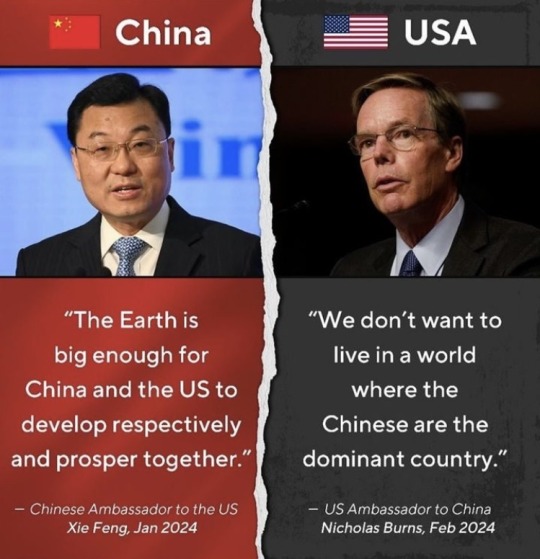
#china#united states#political#political posting#politics#current events#social justice#human rights#usa#leftist#leftism#leftisim#socialist#socialism#communist#communism#fuck the usa#fuck the us government#political issues#genocide joe#china politics#chinese politics#marxism#marxist leninist#marxism leninism#america is a terrorist state#world politics#america is evil#political quotes
9 notes
·
View notes
Text
Chinese projects and investments in Brazil

Chinese companies started 32 previously announced projects in Brazil last year, an increase of 14%, but investments fell 78% to US$1.3bn, the lowest level since 2009.
Most projects, 50%, were in the electric power sector, as information technology accounted for 25%, car manufacturing, infrastructure, agriculture 6% each, and textiles and production of medical devices 3% each, according to the latest study by the China-Brazil business council (CEBC).
Regarding investments, 45% went to the electric power sector, 28% to car manufacturing, 11% textiles, 8% agriculture, 4% information technology and 3% infrastructure.
Brazil was ninth place for Chinese investments and Argentina eighth, with US$1.34bn.
Continue reading.
#brazil#politics#brazilian politics#china#chinese politics#economy#international politics#mod nise da silveira#image description in alt
7 notes
·
View notes